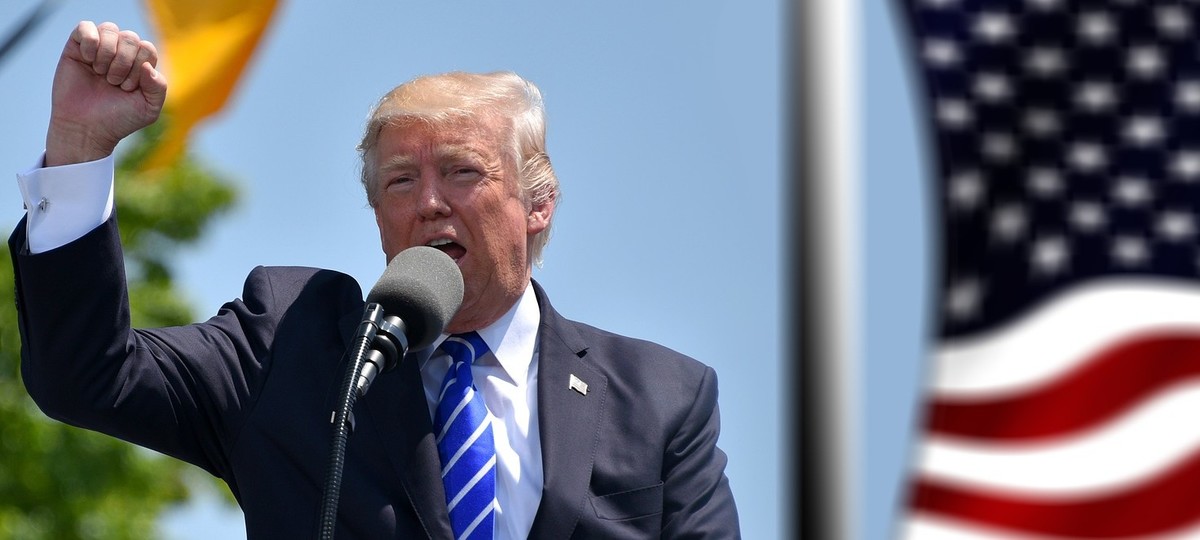
WASHINGTON — President Donald Trump amped up the energy at the United Nations 72nd General Assembly. At his maiden speech before General Assembly Tuesday, Trump called North Korean strongman Kim Jong Un "Rocket Man." He threatened "to totally destroy" the hermit kingdom. He told reporters, "I have decided" whether to certify the international nuclear pact with Iran — but he would not reveal what that decision might be, not even to British Prime Minister Theresa May.
Kim showed himself game for a verbal food fight. "A frightened dog barks louder," he wrote in a first-person statement. It ended, the New York Times reports, "I will surely and definitely tame the mentally deranged U.S. dotard with fire." Dotard? According to Merriam-Webster, the noun applies to a person in his or her dotage. It's the sort of word an old person would use.
Former Obama Undersecretary of State Ellen Tauscher branded the Rocket Man nickname "below the dignity" of an American president. She saw little to gain by poking the North Korean strongman in the eye. German Chancellor Angela Merkel told Deutsche Welle, "I am against such threats."
Their reactions feed a perception that the world's leaders and diplomats are as appalled at Trump's trash talk as any MSNBC host. But that's not how Turtle Bay reacted.
Not long ago, President Moon Jae-In had been pushing for negotiations with Pyongyang. But as Kim's regime has continued to launch missiles, his tune has changed. Thursday Moon told Trump, "Mr. President, I have met you several times, and I've also had many telephone conversations with you. And because of this, I am becoming more and more familiar with you."
Moon then described North Korea's behavior as deplorable, and lauded Trump's remarks. He said, "Mr. President, in the U.N. General Assembly, you made a very strong speech, and I believe that the strength of your speech will also help to change North Korea." That's right, the leader of the nation most vulnerable to Kim's aggression said he liked Trump's speech.
Former Ambassador to Greece, Charles P. Reis, now with the RAND Corporation, noted that the United States is a powerful country with allies that exhibit a "natural instinct" to try to work with Washington.
When asked about the international communities' reaction to America's unorthodox president, Reis gave three examples.
He traveled to China in December. "The Chinese were calm," he said. They figured they could work with Trump. "They take a long view."
"Europeans are focused" on technical issues. They aren't particularly alarmed about Trump.
Many leaders in the Middle East disliked President Barack Obama. "They welcome Trump and they like Trump's rhetoric."
What did the diplomats at the General Assembly think of Trump? "I don't think it matters a whole lot what the people in the room think," said Clifford May of the Foundation For Defense of Democracies.
May rated Trump's U.N. speech as one of his best. Trump's name-calling may not be everyone's cup of tea. May believes, "It's important and useful (Trump) recognizes we have a crisis with North Korea, a threat that cannot be allowed to mature."
Serious people understand that Trump's schoolyard rhetoric is a style crime, whereas Kim's real crimes have starved his own people and threaten free people beyond his borders. His regime has threatened to test a hydrogen bomb.
In the battle of words and in response to Trump's General Assembly speech, South Korea's Yonhap news agency reported, North Korean Foreign Minister Ri Yong-ho said, "I feel sorry for his aides."
"If you're pitied by North Korea," said Reis, "you're really in bad shape." But then, there rarely is an end to a war of insults.
"I do know some of the penalties that have been imposed on members of his staff," May said. In a reference to Kim's apparent contract murder of his half brother, May noted, "We still haven't seen Trump use banned chemical weapons to kill his relatives in international airports."
Kim Jong Un, said Reis, "is pretty unstable."
Trump isn't a diplomat, he is new to foreign policy and he has a lot to learn. It is not clear that his initiatives will be enacted, or if they will work. Then again, the U.N. is staffed by people who have spent their careers in foreign policy — and they haven't exactly done a stellar job getting the U.N. house in order. But they do know which leader is the true menace.
Kim Jong Un, said Reis, "is pretty unstable." It is the North Korean regime, Reis noted, that lacks "significant international support, or even sympathy."


 Contact The Editor
Contact The Editor
 Articles By This Author
Articles By This Author